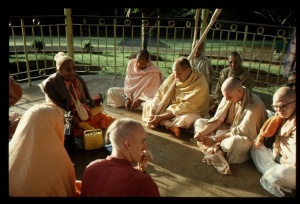SB 6.2.16

A.C. Bhaktivedanta Swami Prabhupada
TEXT 16
- gurūṇāṁ ca laghūnāṁ ca
- gurūṇi ca laghūni ca
- prāyaścittāni pāpānāṁ
- jñātvoktāni maharṣibhiḥ
SYNONYMS
gurūṇām — heavy; ca — and; laghūnām — light; ca — also; gurūṇi — heavy; ca — and; laghūni — light; ca — also; prāyaścittāni — the processes of atonement; pāpānām — of sinful activities; jñātvā — knowing perfectly well; uktāni — have been prescribed; mahā-ṛṣibhiḥ — by great sages.
TRANSLATION
Authorities who are learned scholars and sages have carefully ascertained that one should atone for the heaviest sins by undergoing a heavy process of atonement and one should atone for lighter sins by undergoing lighter atonement. Chanting the Hare Kṛṣṇa mantra, however, vanquishes all the effects of sinful activities, regardless of whether heavy or light.
PURPORT
In this regard, Śrīla Viśvanātha Cakravartī Ṭhākura describes an incident that took place when Sāmba was rescued from the punishment of the Kauravas. Sāmba fell in love with the daughter of Duryodhana, and since according to kṣatriya custom one is not offered a kṣatriya's daughter unless he displays his chivalrous valor, Sāmba abducted her. Consequently Sāmba was arrested by the Kauravas. Later, when Lord Balarāma came to rescue him, there was an argument about Sāmba's release. Since the argument was not settled, Balarāma showed His power in such a way that all of Hastināpura trembled and would have been vanquished as if by a great earthquake. Then the matter was settled, and Sāmba married Duryodhana's daughter. The purport is that one should take shelter of Kṛṣṇa-Balarāma, the Supreme Personality of Godhead, whose protective power is so great that it cannot be equaled in the material world. However powerful the reactions of one's sins, they will immediately be vanquished if one chants the name of Hari, Kṛṣṇa, Balarāma or Nārāyaṇa.